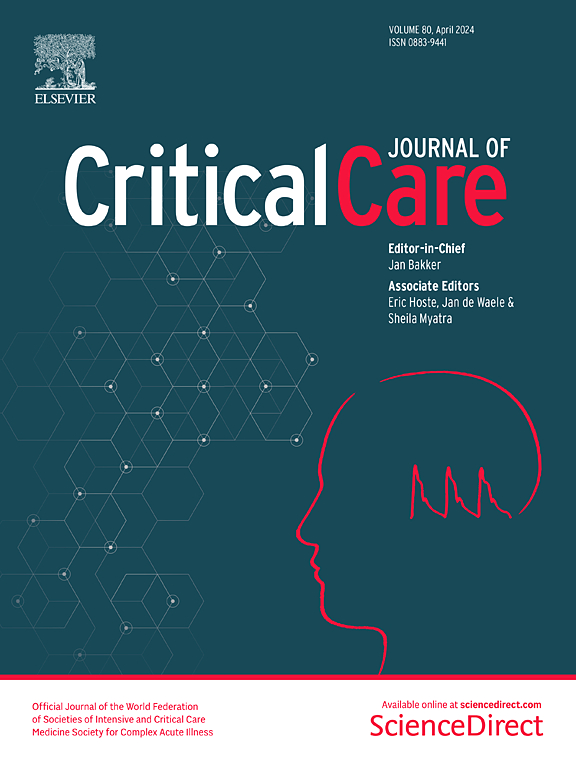The efficacy of fiber-supplemented enteral nutrition in critically ill patients: a systematic review and meta-analysis of randomized controlled trials with trial sequential analysis
IF 8.8
1区 医学
Q1 CRITICAL CARE MEDICINE
引用次数: 0
Abstract
Evidence on the benefits of fiber-supplemented enteral nutrition (EN) in critically ill patients is inconsistent, and critical care nutrition guidelines lack recommendations based on high-quality evidence. This systematic review and meta-analysis (SRMA) aims to provide a current synthesis of the literature on this topic. For this SRMA of randomized controlled trials (RCT), electronic databases (MEDLINE, EMBASE, CENTRAL) were searched systematically from inception to January 2024 and updated in June 2024. Trials investigating clinical effects of fiber-supplemented EN versus placebo or usual care in adult critically ill patients were selected. Two independent reviewers extracted data and assessed the risk of bias of the included studies. Random-effect meta-analysis and trial sequential analysis (TSA) were conducted. The primary outcome was overall mortality, and one of the secondary outcomes was diarrhea incidence. Subgroup analyses were also performed for both outcomes. Twenty studies with 1405 critically ill patients were included. In conventional meta-analysis, fiber-supplemented EN was associated with a significant reduction of overall mortality (RR 0.66, 95% CI 0.47, 0.92, p = 0.01, I2 = 0%; 12 studies) and diarrhea incidence (RR 0.70, 95% CI 0.51, 0.96, p = 0.03, I2 = 51%; 11 studies). However, both outcomes were assessed to have very serious risk of bias, and, according to TSA, a type-1 error cannot be ruled out. No subgroup differences were found for the primary outcome. Very low-certainty evidence suggests that fiber-supplemented EN has clinical benefits. High-quality multicenter RCTs with large sample sizes are needed to substantiate any firm recommendation for its routine use in this group of patients. PROSPERO registration number: CRD42023492829.重症患者补充纤维肠内营养的疗效:随机对照试验的系统回顾和荟萃分析以及试验序列分析
有关重症患者补充纤维素肠内营养(EN)益处的证据并不一致,重症营养指南也缺乏基于高质量证据的建议。本系统综述和荟萃分析(SRMA)旨在提供有关该主题的最新文献综述。为了对随机对照试验(RCT)进行 SRMA,我们对电子数据库(MEDLINE、EMBASE、CENTRAL)进行了系统检索,检索时间从开始检索到 2024 年 1 月,并在 2024 年 6 月进行了更新。研究对象为成年重症患者,研究了纤维素补充EN与安慰剂或常规护理的临床效果。两位独立审稿人提取了数据并评估了纳入研究的偏倚风险。进行了随机效应荟萃分析和试验序列分析(TSA)。主要结果是总死亡率,次要结果之一是腹泻发生率。还对这两项结果进行了分组分析。共纳入了 20 项研究,涉及 1405 名重症患者。在常规荟萃分析中,补充纤维的 EN 可显著降低总死亡率(RR 0.66,95% CI 0.47,0.92,p = 0.01,I2 = 0%;12 项研究)和腹泻发生率(RR 0.70,95% CI 0.51,0.96,p = 0.03,I2 = 51%;11 项研究)。然而,这两项结果都被评估为存在非常严重的偏倚风险,根据 TSA,不能排除 1 型错误。主要结果未发现亚组差异。确定性极低的证据表明,补充纤维的 EN 具有临床益处。需要进行大样本量、高质量的多中心 RCT 研究,以证实在该类患者中常规使用该疗法的任何明确建议。PROSPERO 注册号:CRD42023492829。
本文章由计算机程序翻译,如有差异,请以英文原文为准。
求助全文
约1分钟内获得全文
求助全文
来源期刊

Critical Care
医学-危重病医学
CiteScore
20.60
自引率
3.30%
发文量
348
审稿时长
1.5 months
期刊介绍:
Critical Care is an esteemed international medical journal that undergoes a rigorous peer-review process to maintain its high quality standards. Its primary objective is to enhance the healthcare services offered to critically ill patients. To achieve this, the journal focuses on gathering, exchanging, disseminating, and endorsing evidence-based information that is highly relevant to intensivists. By doing so, Critical Care seeks to provide a thorough and inclusive examination of the intensive care field.
 求助内容:
求助内容: 应助结果提醒方式:
应助结果提醒方式:


